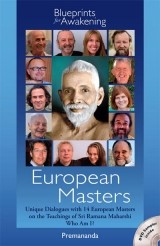
Blueprints for Awakening: European Masters: Unique Dialogues with 14 European Masters on the Teachings of Sri Ramana Maharshi Who am I?
Premananda, Open Sky Press Ltd, Nov 2010, ISBN 978-0956607003. (350 pages).
Buy from Amazon US
Buy from Amazon UK
Note that, when I originally reviewed this book, it also included a free DVD of extracts from the interviews. This is no longer the case.
Premananda is the author of a number of books, including ‘Indian Masters: Blueprints for Awakening’, which I have reviewed at http://www.advaita.org.uk/reading/read_general.htm#blueprints. He spent 15 years with Osho, followed by another 5 with H. W. L. Poonja (Papaji) and much of his teaching now is influenced by Ramana Maharshi. He runs the Open Sky Satsang Community in Germany (between Cologne and Düsseldorf) and periodic meetings are organized throughout Europe.
(Extended biographical details may be found at his website – http://www.premanandasatsang.org/.)
Note that, sometime during the elapsed time since I wrote this review (around 2011), he has reverted to his (presumed) birth name of John David. All reference to the name ‘Premananda’ appears to have been removed from his website and books (although the URL remains the same). I have left the words of the review itself, and the images, as they were in the original review.
Continue reading